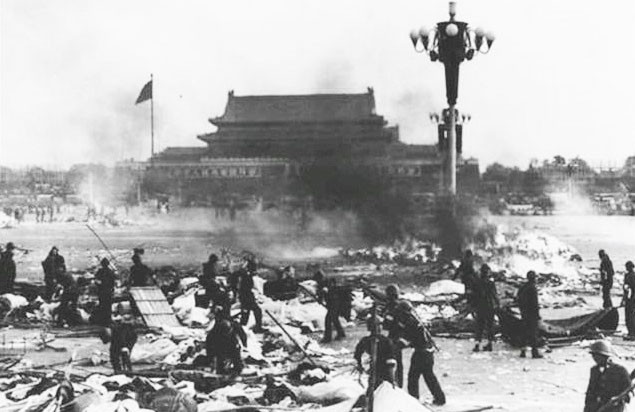- Xinjiang Jin, a Zoom employee is accused of helping to terminate at least four video meetings over Tiananmen Square in May and June, hosted by people based in the US.
- Jin was responsible for monitoring Zoom for China’s government
- He created fake email accounts of the political dissidents and claimed the users were violating terms of service agreements
- Jin would provide the government with information about users and meetings, names, email addresses, and even IP addresses.
- The Chinese authorities either detained users who were visiting the country or threatened their family members to tell the users to stop speaking out against the Communist Party.
A Zoom executive based in China has been charged by the US prosecutors over sabotaging virtual video conferences commemorating the 1989 Tiananmen Square protests and subsequent massacre. Xinjiang Jin, 39, based in China’s Zhejiang Province and served as a security technical leader in Zoom is accused of helping to terminate at least four video meetings over Tiananmen Square in May and June, hosted by people based in the US.
Prosecutors have said that Jin worked under the direction of Chinese intelligence and participated in a scheme to disrupt several video meetings, which were organized and hosted by Americans and attended by Chinese dissidents who had participated in and survived the protests. The video conferences were held to honor the event this year.
Jin has been charged with conspiracy to commit interstate harassment and unlawful conspiracy to transfer a means of identification. A warrant is out for his arrest but since he is staying in China, there is nothing much US prosecutors can do. If arrested in the US, Jin faces up to 10 years in prison.
While Zoom has said it was cooperating with authorities, China has not commented on the case or the allegations. Zoom has said it had “terminated” the employee for violating its policies, and had placed other employees who were similarly accused on administrative leave pending the completion of an ‘internal investigation’.
Xinjiang Jin is now on the ‘Wanted List’ of the FBI. FBI Director Christopher Wray in a statement said that his organization remains committed to protecting the exercise of free speech for all Americans. “As this complaint alleges, that freedom was directly infringed upon by the pernicious activities of Communist China’s Intelligence Services, in support of a regime that neither reflects nor upholds our democratic values”, he said.
Warning Americans about Chinese companies and apps, he categorically stated “Americans should understand that the Chinese Government will not hesitate to exploit companies operating in China to further their international agenda, including repression of free speech.”
Chinese government track participants and their family members
Acting US Attorney Seth DuCharme who read out the charges said, “Jin willingly committed crimes, and sought to mislead others at the company, to help Chinese authorities censor and punish US users’ core political speech merely for exercising their rights to free expression”.
The charges further state that the Chinese authorities “took advantage of the information provided by Jin to retaliate against and intimidate participants” residing in China or family members of participants based in the country. “We learned during the course of our investigation that the China-based former employee charged today violated Zoom’s policies by, among other things, attempting to circumvent certain internal access controls,” it said.
The charges further state that the employee “took actions resulting in the termination of several meetings in remembrance of Tiananmen Square and meetings involving religious and/or political activities” and “also shared or directed the sharing of a limited amount of individual user data with Chinese authorities”.

Jin was responsible for monitoring Zoom for what China’s government considered ‘illegal’ meetings discussing politics and religion. He would often provide the government with information about users and meetings, names, email addresses, and even IP addresses. At the direction government, Jin and other uncharged individuals at Zoom shut down the online conferences commemorating the 31st anniversary of the Tiananmen Square protests.
In order to make his actions look legal, Jin created fake email accounts of the political dissidents and claimed the users were violating terms of service agreements by supporting terrorist organizations, inciting violence, or distributing child pornography. The fake profiles he created had pictures of a masked person holding a flag resembling that of the Islamic State terrorist group.
Jin then used this to convince Zoom executives in the U.S. to terminate meetings and suspend or cancel the accounts of the dissidents and Americans who participated in the meetings.
The details of the dissidents including their addresses, phone numbers, related accounts were then provided by Jin and other Zoom employees to the Chinese authorities. In China, the government either detained users who were visiting the country or threatened their family members to tell the users to stop speaking out against the Communist Party.
Tiananmen Square protests and Massacre
The protests between April and June 1989 were student-led demonstrations in Tiananmen Square calling for democracy in China. On June 4, Chinese troops and security police stormed Tiananmen Square and fired at protesters at will, killing hundreds at the spot and many hundreds in other parts of the city. Estimates peg the count at 300 but dissidents say that the Chinese troops massacred thousands on that day and later.
Any sharing of images, posts, opinions on Tiananmen Square protests and massacre has been banned in China. Violaters are liable to be prosecuted and fined. As witnessed in Hong Kong, pro-democracy protests are a taboo in China and land one in jail for life.
